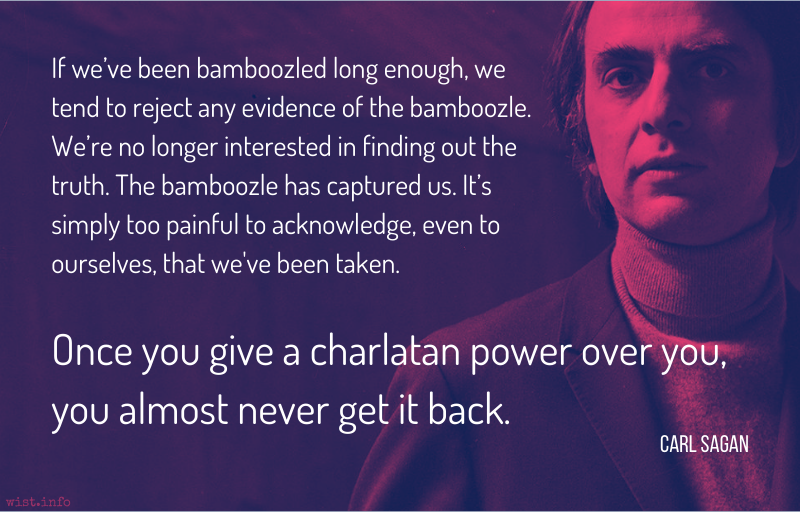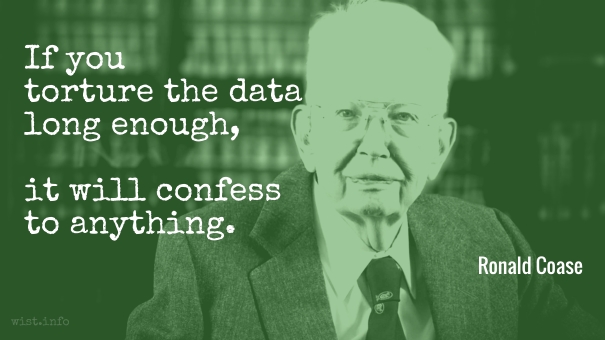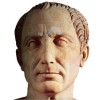You dull your own perceptions
with false imaginings and do not grasp
what would be clear but for your preconceptions.
[Tu stesso ti fai grosso
col falso imaginar, sì che non vedi
ciò che vedresti se l’avessi scosso.]Dante Alighieri (1265-1321) Italian poet
The Divine Comedy [Divina Commedia], Book 3 “Paradiso,” Canto 1, l. 88ff (1.88-90) [Beatrice] (1320) [tr. Ciardi (1970)]
(Source)
Dante's beloved Beatrice greets him for the first time since his arrival in Paradise, chiding him for his terrestrial assumptions of what he's seeing. (Source (Italian)). Alternate translations:
False Forms deceive thy optics. Son of Man!
With shadowy objects which eclipse the true.
[tr. Boyd (1802), st. 20]
With false imagination thou thyself
Mak’st dull, so that thou seest not the thing,
Which thou hadst seen, had that been shaken off.
[tr. Cary (1814)]
Imagination false
Hath made thee dull, so that thou canst not see
That thou might'st, hadst thou looked diligently.
[tr. Bannerman (1850)]
Thou makest thyself so dull
With false imagining, that thou seest not
What thou wouldst see if thou hadst shaken it off.
[tr. Longfellow (1867)]
Thou thyself makest thyself gross with false imagining, so that thou seest not that which thou wouldest have seen, if thou hadst shaken it off.
[tr. Butler (1885)]
Thyself thou makest blind
With thy false fancy, that thou canst not see
What thou wouldst see, if this were thrown behind.
[tr. Minchin (1885)]
Thou thyself makest thyself dull with false imagining, so that thou seest not what thou wouldst see, if thou hadst shaken it off.
[tr. Norton (1892)]
Thou thyself makest thyself dense Earthly with false imagining, and so thou seest not what heavenly thou wouldst see, if thou hadst cast it off.
[tr. Wicksteed (1899)]
Thou dullest thine own wit
With false imagination, nor preceivest
That which thou wouldst perceive, being rid of it.
[tr. Sayers/Reynolds (1962)]
Thou makest thyself dull with false fancies so that thou canst not see as thou wouldst if thou hadst cast them off.
[tr. Sinclair (1939)]
Thou makest thyself dense of wit
With false fancy, so that thou dost not see
What thou would’st see, wert thou but rid of it.
[tr. Binyon (1943)]
You make yourself dull with false imagining, so that you do not see what you would see had you cast it off.
[tr. Singleton (1975)]
You are making yourself stupid
By imagining what isn’t, so that you do not
See what you would if you could shake that off.
[tr. Sisson (1981)]
You make yourself
obtuse with false imagining; you can
not see what you would see if you dispelled it.
[tr. Mandelbaum (1984)]
You have yourself to blame for burdening
your mind with misconceptions that prevent
from seeing clearly what you might have seen.
[tr. Musa (1984)]
You are making yourself swell
with false imagining, so that you do not see
what shaking it off would show.
[tr. Durling (2011)]
You make yourself stupid with false imaginings, and so you do not see, what you would see, if you discarded them.
[tr. Kline (2002)]
With false imaginings
you make yourself so dull you fail to see
what, shaking off this cloud, you’d see quite well.
[tr. Kirkpatrick (2007)]
You make yourself dull-witted
with false notions, so that you cannot see
what you would understand, had you but cast them off.
[tr. Hollander/Hollander (2007)]
You're overwhelming yourself with false
And foolish conjuring, preventing what your eyes
Would see if you did not struggle so hard for triumph.
[tr. Raffel (2010)]
You get all mixed up
By sticking with a figment of your imagination, so
You don’t see what you would see if you shook it off.
[tr. Bang (2021)]
Quotations about:
confirmation bias
Note not all quotations have been tagged, so Search may find additional quotes on this topic.
The same holds true of almost every superstition — as astrology, dreams, omens, judgments, and the like — wherein men, pleased with such vanities, attend to those events which are fulfilments; but neglect and pass over the instances where they fail (though this is much more frequently the case).
[Eadem ratio est fere omnis superstitionis, ut in astrologicis, in somniis, ominibus, nemesibus, et hujusmodi; in quibus homines delectati hujusmodi vanitatibus advertunt eventus, ubi emplentur; ast ubi fallunt, licet multo frequentius, tamen negligunt et praetereunt.]
Francis Bacon (1561-1626) English philosopher, scientist, author, statesman
Instauratio Magna [The Great Instauration], Part 2 “Novum Organum [The New Organon],” Book 1, Aphorism # 46 (1620) [tr. Johnson (1859)]
(Source)
See also Bacon.
(Source (Latin)). Alternate translations:
All superstition is much the same, whether it be that of astrology, dreams, omens, retributive judgment, or the like; in all of which the deluded believers observe events which are fulfilled, but neglect and pass over their failure, though it be much more common.
[tr. Wood (1831)]
And such is the way of all superstition, whether in astrology, dreams, omens, divine judgments, or the like; wherein men, having a delight in such vanities, mark the events where they are fulfilled, but where they fail, though this happen much oftener, neglect and pass them by.
[tr. Spedding (1858)]
The same method is found, perhaps, in every superstition, like astrology, dreams, omens, divine judgements, and so on: people who take pleasure in such vanities notice the results when they are fulfilled, but ignore and overlook them when they fail, though they do fail more often than not.
[tr. Silverthorne (2000)]
That’s how it is with all superstition -- involving astrology, dreams, omens, divine judgments, and the like, Men get so much pleasure out of such vanities that they notice the confirming events and inattentively pass by the more numerous disconfirming ones.
[tr. Bennett (2017)]
Once a man’s understanding has settled on something (either because it is an accepted belief or because it pleases him), it draws everything else also to support and agree with it. And if it encounters a larger number of more powerful countervailing examples, it either fails to notice them, or disregards them, or makes fine distinctions to dismiss and reject them, and all of this with much dangerous prejudice, to preserve the authority of its first conceptions.
[Intellectus humanus in iis quae semel placuerunt (aut quia recepta sunt et credita, aut quia delectant), alia etiam omnia trahit ad suffragationem et consensum cum illis: et licet major sit instantiarum vis et copia, quae occurrunt in contrarium; tamen eas aut non observat, aut contemnit, aut distinguendo summovet et rejicit, non sine magno et pernicioso praejudicio, quo prioribus illis syllepsibus authoritas maneat inviolata.]
Francis Bacon (1561-1626) English philosopher, scientist, author, statesman
Instauratio Magna [The Great Instauration], Part 2 “Novum Organum [The New Organon],” Book 1, Aphorism # 46 (1620) [tr. Silverthorne (2000)]
(Source)
(Source (Latin)). Alternate translations:
The human understanding, when any preposition has been once laid down, (either from general admission and belief, or from the pleasure it affords,) forces every thing else to add fresh support and confirmation; and although more cogent and abundant instances may exist to the contrary, yet either does not observe or despises them, or gets rid of and rejects them by some distinction, with violent and injurious prejudice, rather than sacrifice the authority of its first conclusions.
[tr. Wood (1831)]
The human understanding when it has once adopted an opinion (either as being the received opinion or as being agreeable to itself) draws all things else to support and agree with it. And though there be a greater number and weight of instances to be found on the other side, yet these it either neglects and despises, or else by some distinction sets aside and rejects; in order that by this great and pernicious predetermination the authority of its former conclusions may remain inviolate.
[tr. Spedding (1858)]
The human Intellect, in those things which have once pleased it (either because they are generally received and believed, or because they suit the taste), brings everything else to support and agree with them; and though the weight and number of contradictory instances be superior, still it either overlooks or despises them, or gets rid of them by creating distinctions, not without great and in jurious prejudice, that the authority of these previous conclusions may be maintained inviolate.
[tr. Johnson (1859)]
Once a human intellect has adopted an opinion (either as something it likes or as something generally accepted), it draws everything else in to confirm and support it. Even if there are more and stronger instances against it than there are in its favour·, the intellect either overlooks these or treats them as negligible or does some line-drawing that lets it shift them out of the way and reject them. This involves a great and pernicious prejudgment by means of which the intellect’s former conclusions remain inviolate.
[tr. Bennett (2017)]
Generally speaking, men are influenced by books which clarify their own thought, which express their own notions well, or which suggest to them ideas which their minds are already predisposed to accept.
Carl L. Becker (1873-1945) American historian
The Declaration of Independence, ch. 2 “Natural Rights Philosophy” (1922)
(Source)
Most people learn nothing from experience, except confirmation of their prejudices.
Bertrand Russell (1872-1970) English mathematician and philosopher
“The Lessons of Experience,” New York American (1931-09-23)
(Source)
If you make a great number of predictions, the ones that were wrong will soon be forgotten, and the ones that turn out to be true will make you famous.
Malcolm Gladwell (b. 1963) Anglo-Canadian journalist, author, public speaker
“Dangerous Minds: Criminal Profiling Made Easy,” The New Yorker (12 Nov 2007)
(Source)
The tendency of the casual mind is to pick out or stumble upon a sample which supports or defies its prejudices, and then to make it the representative of a whole class.
Walter Lippmann (1889-1974) American journalist and author
Public Opinion, ch. 10 “The Detection of Stereotypes,” sec. 9 (1922)
(Source)
A middle-aged white male wearing a tie and saying anything with some conviction will be believed by at least 55 percent of people, especially if they already want to believe it. (Sixty-five percent if he has a classy accent.)
Bill Oakley (b. 1966) American television writer and producer
“One of the defenses of Trump is — literally — a TV-cartoon joke,” Washington Post (14 Nov 2019)
(Source)
One of the saddest lessons of history is this: If we’ve been bamboozled long enough, we tend to reject any evidence of the bamboozle. We’re no longer interested in finding out the truth. The bamboozle has captured us. It’s simply too painful to acknowledge, even to ourselves, that we’ve been taken. Once you give a charlatan power over you, you almost never get it back.
Carl Sagan (1934-1996) American scientist and writer
The Demon-Haunted World, ch. 13 (1995)
(Source)
Men of all races have always sought for a convincing explanation of their own astonishing excellence and they have frequently found what they were looking for.
Aubrey Menen (1912-1989) British writer, novelist, satirist, theatre critic
Dead Man in the Silver Market, ch. 1, opening lines (1954)
(Source)
Naturally I am not pointing a finger at me,
But I must admit that I find Mr. Ickes or any other speaker far more convincing when I agree with him than when I disagree.
Ogden Nash (1902-1971) American poet
“Seeing Eye to Eye is Believing,” Good Intentions (1942)
(Source)
When people reject a truth or an untruth it is not because it is a truth or an untruth that they reject it,
No, if it isn’t in accord with their beliefs in the first place they simply say, “Nothing doing,” and refuse to inspect it.
Likewise when they embrace a truth or an untruth it is not for either its truth or its mendacity,
But simply because they have believed it all along and therefore regard the embrace as a tribute to their own fair-mindedness and sagacity.
Ogden Nash (1902-1971) American poet
“Seeing Eye to Eye is Believing,” Good Intentions (1942)
(Source)
And therefore it was a good answer that was made by one who when they showed him hanging in a temple a picture of those who had paid their vows as having escaped shipwreck, and would have him say whether he did not now acknowledge the power of the gods, — “Aye,” asked he again, “but where are they painted that were drowned after their vows?”
[Taque recte respondit ille, qui, cum suspensa tabula in templo ei monstraretur eorum qui vota solverant, quod naufragii periculo elapsi sint, atque interrogando premeretur, anne tum quidem Deorum numen agnosceret, quaesivit denuo, At ubi sunt illi depicti qui post vota nuncupata perierint?]
Francis Bacon (1561-1626) English philosopher, scientist, author, statesman
Instauratio Magna [The Great Instauration], Part 2 “Novum Organum [The New Organon],” Book 1, Aphorism # 46 (1620) [tr. Spedding (1858)]
(Source)
The reference is to Diagoras, in Cicero, De Natura Deorum, 3.37, or to Diogenes the Cynic, in Diogenes Laertius, Lives of Eminent Philosophers, 6.59.
(Source (Latin)). Alternate translations:
It was well answered by him who was shown in a temple the votive tablets suspended by such as had escaped the peril of shipwreck, and was pressed as to whether he would then recognise the power of the gods, by an inquiry; "But where are the portraits of those who have perished in spite of their vows?"
[tr. Wood (1831)]
And so he made a good answer, who, when he was shown, hung up in the temple, the votive tablets of those who had fulfilled their vows after escaping from shipwreck, and was pressed with the question, "Did he not then recognize the will of the gods?" asked, in his turn, "But where are the pictures of those who have perished, notwithstanding their vows?"
[tr. Johnson (1859)]
So when someone was shown a votive tablet in a temple dedicated, in fulfilment of a vow, by some men who had escaped the danger of shipwreck, and was pressed to say whether he would now recognise the divinity of the gods, he made a good reply, when he retorted: "Where are the offerings of those who made vows and perished?"
[tr. Silverthorne (2000)]
A man was shown a picture, hanging in a temple, of people who had made their vows and escaped shipwreck, and was asked ‘Now do you admit the power of the gods?’ He answered with a question: ‘Where are the pictures of those who made their vows and then drowned?’ It was a good answer!
[tr. Bennett (2017)]
It was not the absence of intelligence which led us into trouble but our unwillingness to draw unpleasant conclusions from it.
But the problem with any ideology is that it gives the answer before you look at the evidence. So you have to mold the evidence to get the answer that you’ve already decided you’ve got to have. It doesn’t work that way.
Nearly always, the best deception trades on the enemy’s own preconceptions. If he already believes what you want him to believe, you have merely to confirm his own ideas rather than to undertake the more difficult task of inserting new ones into his mind.
Everyone is prejudiced in favor his own powers of discernment, and will always find an argument most convincing if it leads to the conclusion he has reached for himself; everyone must then be given something he can grasp and recognize as his own idea.
The point is that we are all capable of believing things which we know to be untrue, and then, when we are finally proved wrong, impudently twisting the facts so as to show that we were right.
Earthly minds, like mud walls, resist the strongest batteries: and though, perhaps, sometimes the force of a clear argument may make some impression, yet they nevertheless stand firm, and keep out the enemy, truth, that would captivate or disturb them. Tell a man passionately in love that he is jilted; bring a score of witnesses of the falsehood of his mistress, it is ten to one but three kind words of hers shall invalidate all their testimonies.
Be careful. People like to be told what they already know. Remember that. They get uncomfortable when you tell them new things. New things … well, new things aren’t what they expect. They like to know that, say, a dog will bite a man. That is what dogs do. They don’t want to know that man bites a dog, because the world is not supposed to happen like that. In short, what people think they want is news, but what they really crave is olds … Not news but olds, telling people that what they think they already know is true.
The Christian determination to find the world ugly and bad has made the world ugly and bad.
[Der christliche Entschluss, die Welt hässlich und schlecht zu finden, hat die Welt hässlich und schlecht gemacht.]
Friedrich Nietzsche (1844-1900) German philosopher and poet
The Gay Science [Die fröhliche Wissenschaft], Book 3, § 130 (1882) [tr. Hill (2018)]
(Source)
Also known as La Gaya Scienza, The Joyful Wisdom, or The Joyous Science.
(Source (German)). Alternate translations:
The Christian resolution to find the world ugly and bad, has made the world ugly and bad.
[tr. Common (1911)]
The Christian resolve to find the world ugly and bad, has made the world ugly and bad.
[tr. Kaufmann (1974)]
The Christian decision to find the world ugly and bad has made the world ugly and bad.
[tr. Nauckhoff (2001)]
Once you touch the biographies of human beings, the notion that political beliefs are logically determined collapses like a pricked balloon.
Walter Lippmann (1889-1974) American journalist and author
A Preface to Morals, ch. 7 (1913)
(Source)
Man prefers to believe what he wants to be true. He rejects what is difficult because he is too impatient to make the investigation; he rejects sensible ideas, because they limit his hopes; he rejects the deeper truths of nature because of superstition; he rejects the light of experience, because he is arrogant and fastidious, believing that the mind should not be seen to be spending its time on mean, unstable things; and he rejects anything unorthodox because of common opinion. In short, emotion marks and stains the understanding in countless ways which are sometimes impossible to perceive.
[Quod enim mavult homo verum esse, id potius credit. Rejicit itaque difficilia, ob inquirendi impatientiam; sobria, quia coarctant spem; altiora naturae, propter superstitionem; lumen experientiae, propter arrogantiam et fastum, ne videatur mens versari in vilibus et fluxis; paradoxa, propter opinionem vulgi; denique innumeris modis, iisque interdum imperceptibilibus, affectus intellectum imbuit et inficit.]
Francis Bacon (1561-1626) English philosopher, scientist, author, statesman
Instauratio Magna [The Great Instauration], Part 2 “Novum Organum [The New Organon],” Book 1, Aphorism # 49 (1620) [tr. Silverthorne (2000)]
(Source)
See Demosthenes.
(Source (Latin)). Alternate translations:
For man always believes more readily that which he prefers. He, therefore, rejects difficulties for want of patience in investigation; sobriety, because it limits his hope; the depths of nature, from superstition; the light of experiment, from arrogance and pride, lest his mind should appear to be occupied with common and varying objects; paradoxes, from a fear of the opinion of the vulgar; in short, his feelings imbue and corrupt his understanding in innumerable and sometimes imperceptible ways.
[tr. Wood (1831)]
For what a man had rather were true he more readily believes. Therefore he rejects difficult things from impatience of research; sober things, because they narrow hope; the deeper things of nature, from superstition; the light of experience, from arrogance and pride, lest his mind should seem to be occupied with things mean and transitory; things not commonly believed, out of deference to the opinion of the vulgar. Numberless in short are the ways, and sometimes imperceptible, in which the affections colour and infect the understanding.
[tr. Spedding (1858)]
For man more readily believes what he wishes to be true. And so it rejects difficult things, from impatience of inquiry; -- sober things, because they narrow hope; -- the deeper thigns of Nature, from superstition; -- the light of experience, from arrogance and disdain, lest the mind should seem to be occupied with worthless and changing matters; -- paradoxes, from a fear of the opinion of the vulgar: -- in short, the affections enter and corrupt the intellect in innumerable ways, and these sometimes imperceptible.
[tr. Johnson (1859)]
For a man is more likely to believe something if he would like it to be true. Therefore he rejectsIn short, there are countless ways in which, sometimes imperceptibly, a person’s likings colour and infect his intellect.
- difficult things because he hasn’t the patience to research them,
- sober and prudent things because they narrow hope,
- the deeper things of nature, from superstition,
- the light that experiments can cast, from arrogance and pride (not wanting people to think his mind was occupied with trivial things),
- surprising truths, out of deference to the opinion of the vulgar.
[tr. Bennett (2017)]

























